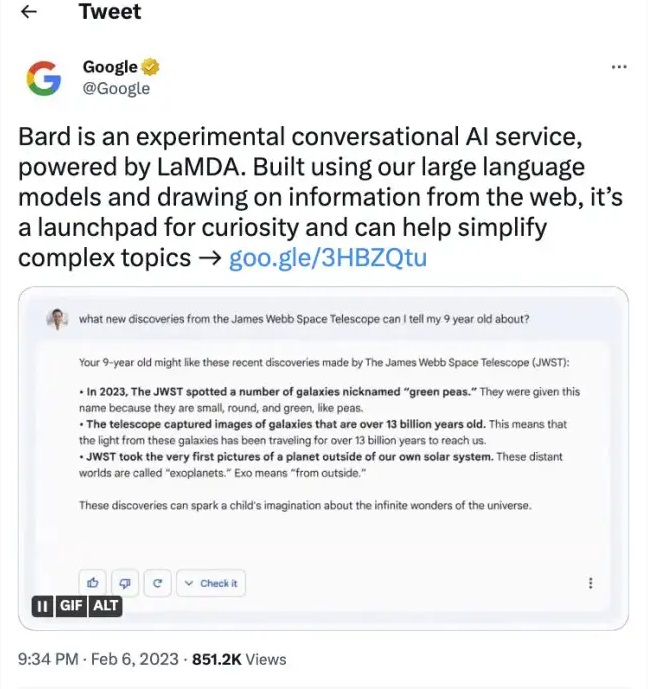
Mistake that cost Google $100bn: Bard chatbot makes factual error on first demo
Google has shown a small commercial in which it wanted to show the capabilities of its artificial intelligence (AI)-powered chatbot named Bard, which is currently considered the main competitor of ChatGPT.
Astronomers and astrophysicists, however, immediately noticed a factual error in the chatbot's answer. The AI wrote that the first photo of an exoplanet outside the solar system was taken by the James Webb Space Telescope, whereas the first photo of an exoplanet was actually taken in 2004 by the Very Large Telescope (VLT).
This mistake has cost Google dearly. The stock price of the parent company Alphabet—which owns Google—fell by more than 7%, and as a result, the market value of the company decreased by $100 billion.
The chatbot made a mistake when answering the first question
In a video published by Google, the aforesaid chatbot is asked to talk about the latest discoveries made by the James Webb Space Telescope in a way that a 9-year-old can understand. In its reply, the chatbot talked about three discoveries, including the first photo of an exoplanet outside the solar system.

In a video published by Google, the aforesaid chatbot is asked to talk about the latest discoveries made by the James Webb Space Telescope in a way that a 9-year-old can understand. In its reply, the chatbot talked about three discoveries, including the first photo of an exoplanet outside the solar system.
The chatbot's response disappointed many scientists, including astronomer Bruce McIntosh and astrophysicist Grant Tremblay. According to them, Google experts should have pre-checked Bard's answers before showing them to the public.
"Not to be a well, actually jerk, and I'm sure Bard will be impressive, but for the record: JWST did not take ‘the very first image of a planet outside our solar system,’" Tremblay tweeted.
"I speak as the person who photographed the exoplanet 14 years before the James Webb launch. perhaps a better example should have been found to demonstrate the capabilities of the chatbot," wrote Bruce McIntosh, director of the observatory at the University of California, Santa Cruz.
Bruce Macintosh, the director of the University of California Observatories and part of the team that took the first images of exoplanets, also noticed the error, writing on Twitter: “Speaking as someone who imaged an exoplanet 14 years before JWST was launched, it feels like you should find a better example?”
“Ironically, if you actually search ‘what is the first image of an exoplanet’ on the original Google, the old-school Google, it gives you the correct answer. And so it’s funny that Google, in rolling out their huge multibillion dollar play into this new space, didn’t fact check on their own website,” Tremblay told New Scientist.
A mistake that cost $100 billion
When the Bard chatbot bug became known, shares of Google's parent company, Alphabet, fell more than 7%, reducing the company's market value by $100 billion.
As the BBC reports, investors were also not impressed by the company's presentation of plans to implement AI in its products.
Investors seemed to expect more from Google's presentation, especially amid growing competition from Microsoft, which recently introduced a ChatGPT chatbot to its Bing search engine, which is clearly performing better.
Is the world not ready for AI chatbots yet?
Many experts believe that AI tools are not yet ready to be integrated into search engines, and therefore there should be no rush in this matter.
Carissa Veliz at the University of Oxford believes this story once again shows that the shift to using AI-powered chatbots for web search results is happening very quickly, which means the potential for misinformation to spread is huge.
“It perfectly shows the most important weakness of statistical systems. These systems are designed to give plausible answers, depending on statistical analysis – they’re not designed to give out truthful answers,” she says.
“We’re definitely not ready for what’s coming. Companies have a financial interest in being the first ones to develop or to implement certain kinds of systems, and they’re just rushing through it,” says Veliz. “So we’re not giving society time to talk about it and to think about it and they’re not even thinking about it very carefully themselves, as is obvious by the example of this ad.”
- Related News
- Android 15 to get two useful new features
- Google fires 28 employees who protested against company's cooperation with Israel
- What are the best selling smartphones in the world?
- Key Google Pixel feature will soon be available on iPhone as well
- Instead of writing, dictate the email in Gmail. Google Workspace will get a number of AI tools
- Fraudsters have started using Google's popular service to steal users' money
- Most read
month
week
day
- Once in a lifetime phenomenon: This year we will observe a star explosion that occurred 3,000 years ago 905
- Meta unveils Llama 3 and claims it's the "most powerful" open source language model 898
- WhatsApp to integrate AI function: What will it do? 838
- Google fires 28 employees who protested against company's cooperation with Israel 814
- iPhone 17 Plus will have smaller screen 768
- 5 best smartphones with IPS screens 752
- How DNA analysis helps to solve crimes and who can sell your DNA data and why: Interview with former FBI scientist Bruce Budowle 734
- Huge battery, IP68/IP69K and MIL-STD-810H certifications: Ulefone will present the Armor Pad 3 Pro tablet (photo) 712
- Sentry Enterprise presents first bank card with screen: How does it work? 608
- What risks do crypto and digital currencies pose? Interview with Rasmus Nielsen 579
- Read also
- Archive








